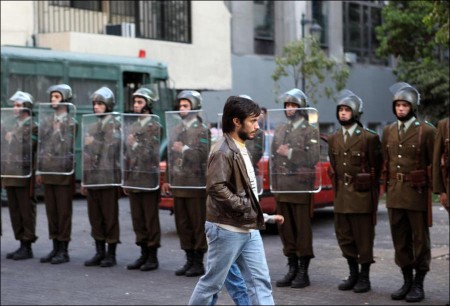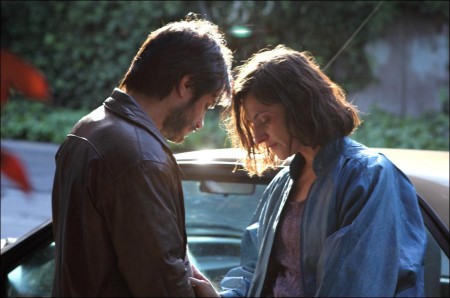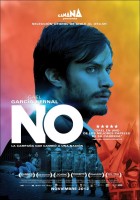Taglines: Adiós, Mr. Pinochet.
Based on a true story, when Chilean military dictator Augusto Pinochet, facing international pressure, calls for a referendum on his presidency in 1988, opposition leaders persuade a brash young advertising executive, Rene Saavedra (Gael García Bernal), to spearhead their campaign. With scant resources and constant scrutiny by the despot’s watchmen, Saavedra and his team devise an audacious plan to win the election and free their country from oppression.
In 1988, Chilean military dictator Augusto Pinochet, due to international pressure, is forced to call a plebiscite on his presidency. The country will vote YES or NO to Pinochet extending his rule for another eight years. Opposition leaders for the NO persuade a brash young advertising executive, Rene Saavedra (Gael Garcia Bernal), to spearhead their campaign. Against all odds, with scant resources and under scrutiny by the despot’s minions, Saavedra and his team devise an audacious plan to win the election and set Chile free.
No is a Chilean drama film directed by Pablo Larraín. The film is based on the unpublished play El Plebiscito, written by Antonio Skármeta. Mexican actor Gael García Bernal plays René, an in-demand advertising man working in Chile in the late 1980s. The historical moment the film captures is when advertising tactics came to be widely used in political campaigns. The campaign in question was the historic 1988 plebiscite of the Chilean citizenry over whether dictator Augusto Pinochet should stay in power for another eight years. At the 85th Academy Awards the film was nominated for the Best Foreign Language Film Oscar.
About the Story (2013)
After fifteen years of military dictatorship but facing considerable international pressure, the public of Chile is asked by the government to vote in the national plebiscite of 1988 on whether General Augusto Pinochet should stay in power for another eight years or whether there should be an open democratic presidential election the next year.
René Saavedra, a successful advertisement creator, is approached by the “No” side committee to consult on their proposed advertising. Behind the back of his politically conservative boss, Saavedra agrees to come and finds that the advertising in question is a dourly unappealing litany of the regime’s abuses created by an organization that has no confidence in its efforts. Enticed with this marketing challenge and his own loathing of Pinochet’s tyranny, he proposes with the advertising subcommittee to take a lightheartedly upbeat promotional approach stressing abstract concepts like “happiness” to challenge concerns that voting in a referendum under a notoriously brutal military junta would be politically meaningless and dangerous.
Although Saavedra, his son and his comrades are eventually targeted for intimidation by the authorities while the unorthodox marketing theme is dismissed by some No members as a facile dismissal of the regime’s horrific abuses, the proposal is approved for the campaign. Eventually, Saavedra’s boss, Lucho, finds out about his employee’s activities, but when Saavedra refuses an offer to become a partner if he withdraws, Lucho goes to head the “Yes” campaign as a matter of survival.
The campaign took place in 27 nights of television advertisements, in which each side had 15 minutes per night to present its point of view. Over that month, the “No” campaign, created by the majority of Chile’s artistic community, proves effective with a series of entertaining and insightful presentations that have an irresistible cross-demographic appeal. By contrast, the “Yes” campaign’s advertising, having only dry positive economic data in its favor and few creative personnel on call, is derided even by government officials as repellently crass and heavy-handed.
Although the government tries to interfere with the “No” side with further intimidation and blatant censorship, Saavedra and his team use those tactics to their favor in their marketing and public sympathy shifts to them. As the campaign heats up in the concluding days with the “No” following up with international Hollywood celebrity spots and wildly popular street concert rallies, even police attacks cannot discourage the “No” campaign while the “Yes” side is reduced to desperately parodying the “No” ads.
On the day of the referendum, it momentarily appears that the “Yes” vote has the lead, but the final result turns out to be firmly on the “No” side. The final proof only comes when the troops surrounding the No headquarters strangely withdraw as the news of the Chilean senior military command forcing Pinochet to concede comes through. After the success, Saavedra, undecided as to what to think about it, and his boss resume their normal advertising business with a new Chile being born.
No (2013)
Directed by: Pablo Larraín
Starring: Gael García Bernal, Jane Fonda, Richard Dreyfuss, Christopher Reeve, Alfredo Castro
Screenplay by: Pedro Peirano
Cinematography by: Sergio Armstrong
Film Editing by: Andrea Chignoli
Costume Design by: Francisca Román
Set Decoration by: María Eugenia Hederra
Music by: Carlos Cabezas
MPAA Rating: R for language.
Studio: Sony Pictures Classics
Release Date: February 15, 2013
Visits: 59





